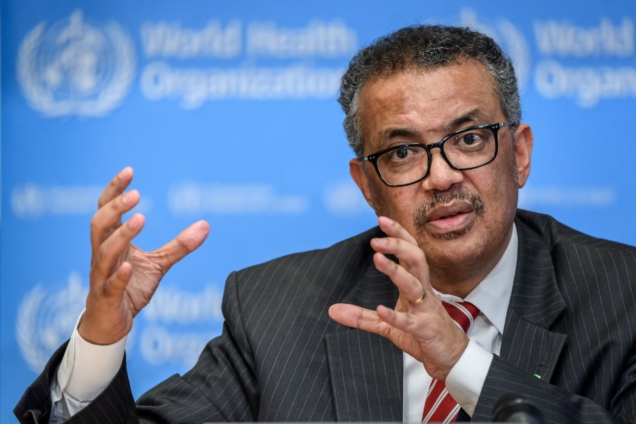The World Health Organization is considering “airborne precautions” for medical staff after a new study showed the coronavirus can survive in the air in some settings.
The virus is transmitted through droplets, or little bits of liquid, mostly through sneezing or coughing, Dr. Maria Van Kerkhove, head of WHO’s emerging diseases and zoonosis unit, told reporters during a virtual news conference on Monday. “When you do an aerosol-generating procedure like in a medical care facility, you have the possibility to what we call aerosolize these particles, which means they can stay in the air a little bit longer.”
She added: “It’s very important that health-care workers take additional precautions when they’re working on patients and doing those procedures.”
World health officials say the respiratory disease spreads through human-to-human contact, droplets carried through sneezing and coughing as well as germs left on inanimate objects. The coronavirus can go airborne, staying suspended in the air depending on factors such as heat and humidity, they said.
Kerkhove said health officials are aware of several studies in a number of countries looking at the different environmental conditions that COVID-19 can persist. Scientists are specifically looking at how humidity, temperature and ultraviolet lighting affects the disease as well as how long it lives on different surfaces, including steel, she said.
Health officials use the information to make sure WHO’s guidance is appropriate, and “so far ... we are confident that the guidance that we have is appropriate,” she added. Health officials recommend medical staff wear so-called N95 masks because they filter out about 95% of all liquid or airborne particles.
“In health-care facilities, we make sure health-care workers use standard droplet precautions with the exception ... that they’re doing an aerosol-generating procedure,” she said.

WATCH NOWVIDEO01:01Wondering if insurance will cover the coronavirus - here is what you need to know
Robert Redfield, director of the U.S. Centers for Disease Control and Prevention, told Congress last month that the agency was aggressively evaluating how long COVID-19 can survive, particularly on surfaces.
“On copper and steel, it’s pretty typical, it’s pretty much about two hours,” Redfield said at a House hearing. “But I will say on other surfaces — cardboard or plastic — it’s longer, and so we are looking at this.”
Redfield added infections contracted from surfaces rather than through the air could have contributed to the outbreak on the Diamond Princess cruise ship.
Separately, WHO Director-General Dr. Tedros Adhanom Ghebreyesus said Monday that there’s been a rapid escalation of COVID-19 cases over the past week, adding, “we have not seen an urgent enough escalation in testing, isolation and contact tracing, which is the backbone of the response.”
“We have a simple message for all countries: test, test, test. Test every suspected case, if they test positive, isolate them and find out who they have been in contact with two days before they developed symptoms and test those people, too,” Tedros said.
Latest Stories
-
Queenmother calls on President-elect Mahama to appoint more women in his government
36 minutes -
Atletico Madrid beat Barcelona to go top of La Liga
54 minutes -
Usyk breaks Fury’s heart with points win in rematch
57 minutes -
Ghana-Russia Centre to run Russian language courses in Ghana
6 hours -
The Hidden Costs of Hunger: How food insecurity undermines mental and physical health in the U.S.
7 hours -
18plus4NDC marks 3rd anniversary with victory celebration in Accra
10 hours -
CREMA workshop highlights collaborative efforts to sustain Akata Lagoon
10 hours -
2024/25 Ghana League: Heart of Lions remain top with win over Basake Holy Stars
11 hours -
Black Queens: Nora Hauptle shares cryptic WAFCON preparation message amid future uncertainty
11 hours -
Re-declaration of parliamentary results affront to our democracy – Joyce Bawah
11 hours -
GPL 2024/25: Vision FC score late to deny Young Apostles third home win
12 hours -
Enhancing community initiatives for coastal resilience: Insights from Keta Lagoon Complex Ramsar Site Workshop
12 hours -
Family Health University College earns a Presidential Charter
12 hours -
GPL 2024/25: Bibiani GoldStars beat Nsoatreman to keep title race alive
12 hours -
GPL 2024/25 Bechem United keep title hopes alive with narrow win over FC Samartex
12 hours

